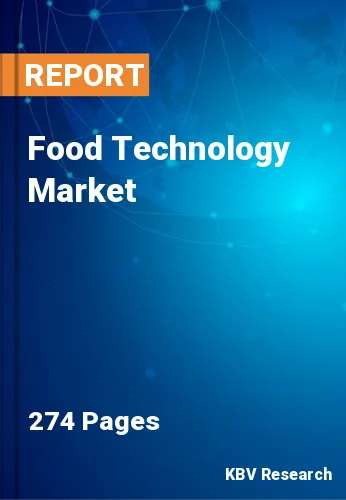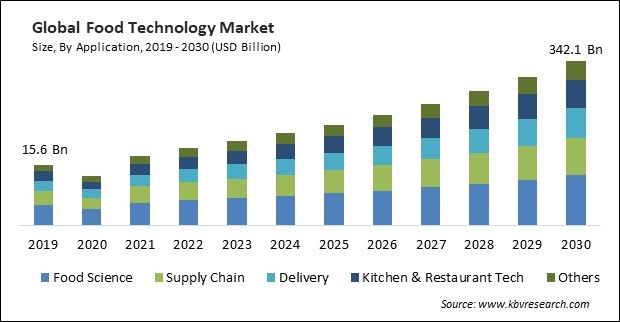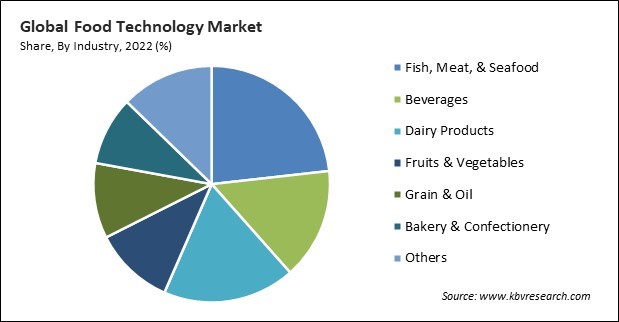
The Global Food Technology Market size is expected to reach $342.1 billion by 2030, rising at a market growth of 10.1% CAGR during the forecast period.
Food technology ensures the consistent quality and texture of baked goods and confectionery through precise temperature and humidity control, optimizing results. Automated mixing, proofing, and baking processes enhance production efficiency, reducing labor costs and production times. Consequently, the Bakery & Confectionery segment generated $15,026.3 million revenue in the market in 2022. Food technology supports the creation of new bakery and confectionery products with unique flavors, shapes, and textures to cater to evolving consumer tastes. Automated quality control systems identify and reject products that do not meet quality standards, reducing waste and improving product quality. Technology allows for the customization of baked goods to meet specific dietary requirements, including gluten-free, vegan, and allergen-free options. Some of the factors impacting the market are rapidly increasing global population, increasing use in supply chain management, and high initial costs and resource constraints.

The rising global population signifies a higher demand for food products. Food technology plays a pivotal role in addressing this demand by optimizing agricultural practices, enhancing crop yields, and improving food processing methods. These technological advancements ensure a consistent and sufficient food supply to feed the expanding population. As the global population grows, there is a need for increased food distribution efficiency. Food technology aids in creating streamlined supply chain management systems, allowing for the efficient transportation and distribution of food products from production centers to consumer markets. Additionally, from farm to table, supply chain management streamlines the movement of food products, guaranteeing that food is delivered to customers in a timely and economical manner. Advanced supply chain technologies, such as real-time tracking and data analytics, allow for precise inventory management and reduce food wastage, benefiting producers and consumers. This efficient distribution of food is a fundamental element of the market, ensuring that products are delivered fresh and unspoiled. These insights enable food technology companies to adapt quickly, reducing the risk of food shortages or surpluses and ensuring a steady food supply. Hence, the rising use of food technology in supply chain management is beneficial for the market's growth.
However, in order to create and execute innovative food technology solutions, substantial initial investments in R&D, specialized equipment, as well as infrastructure are frequently needed. Small and medium-sized businesses (SMEs) and startups might find it difficult to raise the money they need, which would hinder their ability to compete and innovate in the market. The high barrier to entry may discourage would-be inventors and impede the food industry's overall rate of technological development. Addressing these constraints and finding resource-efficient alternatives is critical to ensure the long-term sustainability of food technology solutions. Thus, currently, the high cost of most food technologies and other resource constraints of smaller companies prevents the expansion of the market.
Based on component, the market is classified into hardware, software, and services. The hardware segment garnered the highest revenue share in the market in 2022. Throughout the food value chain, hardware includes a variety of gadgets like cooking robots, voice assistants, self-ordering kiosks at restaurants, and delivery drones and robots. Furthermore, through temperature monitoring, IoT sensors can reduce waste. The factors propelling the growth of this segment are the need to comply with regulations, enhance customer satisfaction, and optimize supply chain efficiency.
By industry, the market is segmented into fish, meat, & seafood, fruits & vegetables, grains & oil, dairy products, beverages, bakery & confectionery, and others. The dairy products segment witnessed a remarkable growth rate in the market in 2022. Food technology enables pasteurization, ultra-high temperature (UHT) treatment, and aseptic packaging, extending the shelf life of dairy products like milk and yogurt, reducing food waste, and expanding distribution reach. Technologies such as microbial testing and quality control systems ensure the safety of dairy products by detecting contaminants and pathogens, reducing the risk of foodborne illnesses. Dairy technology facilitates the development of various dairy products, including cheeses, yogurt, and butter, with distinct flavors, textures, and nutritional profiles to meet consumer preferences.

On the basis of application, the market is divided into food science, kitchen & restaurant tech, delivery, supply chain, and others. The kitchen & restaurant tech segment recorded a significant revenue share in the market in 2022. Kitchen and restaurant tech, powered by food technology, streamlines kitchen operations, reducing wait times and improving service. Automated cooking and food preparation systems ensure consistency in the taste and presentation of dishes, enhancing the dining experience. Software applications help track ingredient inventory, reduce waste, and facilitate efficient procurement. Restaurant tech can adapt menus in real-time based on ingredient availability, ensuring a smoother dining experience for customers.
| Report Attribute | Details |
|---|---|
| Market size value in 2022 | USD 160.2 Billion |
| Market size forecast in 2030 | USD 342.1 Billion |
| Base Year | 2022 |
| Historical Period | 2019 to 2021 |
| Forecast Period | 2023 to 2030 |
| Revenue Growth Rate | CAGR of 10.1% from 2023 to 2030 |
| Number of Pages | 274 |
| Number of Table | 410 |
| Report coverage | Market Trends, Revenue Estimation and Forecast, Segmentation Analysis, Regional and Country Breakdown, Companies Strategic Developments, Company Profiling |
| Segments covered | Component, Application, Industry, Region |
| Country scope | US, Canada, Mexico, Germany, UK, France, Russia, Spain, Italy, China, Japan, India, South Korea, Singapore, Malaysia, Brazil, Argentina, UAE, Saudi Arabia, South Africa, Nigeria |
| Growth Drivers |
|
| Restraints |
|
Region-wise, the market is analyzed across North America, Europe, Asia Pacific, and LAMEA. The Asia Pacific region acquired the highest revenue share in the market in 2022. Asia Pacific is home to a sizeable share of the world's population. About 60% of the world's population lives in Asia and the Pacific, according to the United Nations Population Fund (UNFP). Moreover, the region is seeing a notable increase in the e-commerce industry. The COVID-19 pandemic expedited the region's adoption of on-demand food delivery platforms. Many companies are active in the market in the region; some of them are Swiggy from India, Mr. Yum from Australia, and NEXT GEN FOODS PTE. LTD. from Singapore. Asia Pacific's e-commerce sector is expanding due to a large population and quick adoption, which is propelling the demand for food technology solutions in various food-based industries.
Free Valuable Insights: Global Food Technology Market size to reach USD 342.1 Billion by 2030
The market research report covers the analysis of key stake holders of the market. Key companies profiled in the report include Delivery Hero SE, HelloFresh SE, Swiggy, Flytrex Inc., Trax Technology Solutions Pte. Ltd., CUBIQ FOODS S.L., Lunchbox Technologies, Inc., Miso Robotics, Inc., Carlisle Technology, and Domino's Pizza, Inc.
By Application
By Industry
By Component
By Geography
This Market size is expected to reach $342.1 billion by 2030.
Rapidly increasing global population are driving the Market in coming years, however, High initial costs and resource constraints restraints the growth of the Market.
Delivery Hero SE, HelloFresh SE, Swiggy, Flytrex Inc., Trax Technology Solutions Pte. Ltd., CUBIQ FOODS S.L., Lunchbox Technologies, Inc., Miso Robotics, Inc., Carlisle Technology, and Domino's Pizza, Inc.
The expected CAGR of this Market is 10.1% from 2023 to 2030.
The Fish, Meat, & Seafood segment is leading the Market, by Industry in 2022 thereby, achieving a market value of $72.8 Billion by 2030.
The Asia Pacific region dominated the Market, by Region in 2022, and would continue to be a dominant market till 2030; thereby, achieving a market value of $116.7 Billion by 2030.
Our team of dedicated experts can provide you with attractive expansion opportunities for your business.
